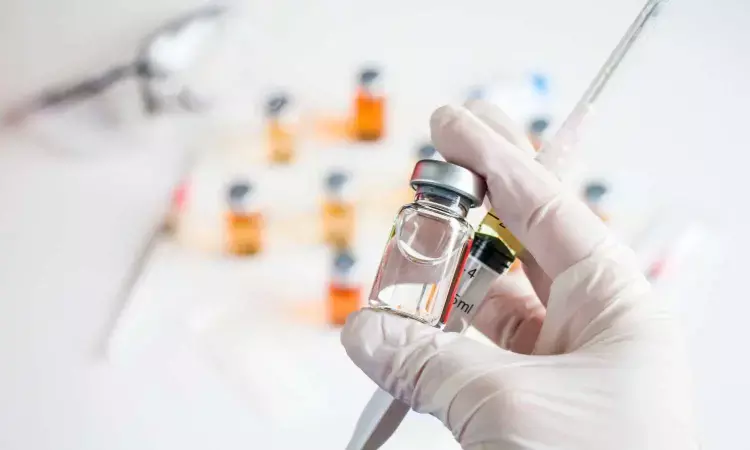- Home
- Medical news & Guidelines
- Anesthesiology
- Cardiology and CTVS
- Critical Care
- Dentistry
- Dermatology
- Diabetes and Endocrinology
- ENT
- Gastroenterology
- Medicine
- Nephrology
- Neurology
- Obstretics-Gynaecology
- Oncology
- Ophthalmology
- Orthopaedics
- Pediatrics-Neonatology
- Psychiatry
- Pulmonology
- Radiology
- Surgery
- Urology
- Laboratory Medicine
- Diet
- Nursing
- Paramedical
- Physiotherapy
- Health news
- Fact Check
- Bone Health Fact Check
- Brain Health Fact Check
- Cancer Related Fact Check
- Child Care Fact Check
- Dental and oral health fact check
- Diabetes and metabolic health fact check
- Diet and Nutrition Fact Check
- Eye and ENT Care Fact Check
- Fitness fact check
- Gut health fact check
- Heart health fact check
- Kidney health fact check
- Medical education fact check
- Men's health fact check
- Respiratory fact check
- Skin and hair care fact check
- Vaccine and Immunization fact check
- Women's health fact check
- AYUSH
- State News
- Andaman and Nicobar Islands
- Andhra Pradesh
- Arunachal Pradesh
- Assam
- Bihar
- Chandigarh
- Chattisgarh
- Dadra and Nagar Haveli
- Daman and Diu
- Delhi
- Goa
- Gujarat
- Haryana
- Himachal Pradesh
- Jammu & Kashmir
- Jharkhand
- Karnataka
- Kerala
- Ladakh
- Lakshadweep
- Madhya Pradesh
- Maharashtra
- Manipur
- Meghalaya
- Mizoram
- Nagaland
- Odisha
- Puducherry
- Punjab
- Rajasthan
- Sikkim
- Tamil Nadu
- Telangana
- Tripura
- Uttar Pradesh
- Uttrakhand
- West Bengal
- Medical Education
- Industry
Experimental vaccine found effective against both ocular trachoma and urogenital chlamydia in Phase 1 trial: Lancet

Initial results from a recent Phase 1 clinical trial indicate that the experimental vaccine CTH522 could be a crucial tool against both ocular trachoma and urogenital chlamydia. The key findings were published in The Lancet Infectious Diseases.
The CHLM-02 trial was conducted at the National Institute for Health Research Imperial Clinical Research Facility in London, UK. It involved healthy male and female participants from 18 to 45 years, all of whom were free from any pre-existing genital infections caused by C. trachomatis. This double-blind, randomized, placebo-controlled trial assessed the safety and immunogenicity of various dosing regimens of the vaccine candidate CTH522 which is a recombinant protein based on the major outer membrane molecule of bacterium.
The participants were divided into six groups where five groups received the vaccine in different dosing formats and combinations, and one group receiving a placebo. The vaccine was administered intramuscularly, intradermally and topically into the eye in prime-boost regimens by utilizing two different liposomal adjuvants, the CAF01 and CAF09b.
The results from the trial from February 2020 to February 2022 were highly encouraging. A total of 65 participants were enrolled where 60 participants completed the trial. The study reported no serious adverse events and the majority of side effects were mild to moderate. Also, a 100% seroconversion rate was observed by day 42 in all active vaccine groups that indicates a significant immune response.
The different administration routes seemed to improve vaccine efficacy against specific types of infections. The intradermal administration of CTH522 led to high titers of neutralizing antibodies against the serovars linked with trachoma and genital infections. The topical ocular administration significantly elevated ocular IgA levels which suggested potential effectiveness against ocular trachoma.
The primary outcome of the trial was to evaluate safety while the secondary outcome focused on humoral immunogenicity, specifically the percentage of the participants who achieved a significant increase in anti-CTH522 IgG antibody levels. The findings suggest that CTH522 when adjuvanted with CAF01, induced robust serum IgG binding titers. Also, participants developed strong cell-mediated immune responses in groups who received the vaccine with the CAF09b adjuvant. Further research through the Phase 2 clinical trials would test effectiveness of CTH522 in larger populations. If successful, this vaccine candidate could become a critical resource in controlling and potentially eradicating infections caused by C. trachomatis.
Reference:
Pollock, K. M., Borges, Á. H., Cheeseman, H. M., Rosenkrands, I., Schmidt, K. L., Søndergaard, R. E., Day, S., Evans, A., McFarlane, L. R., Joypooranachandran, J., Amini, F., Skallerup, P., Dohn, R. B., Jensen, C. G., Olsen, A. W., Bang, P., Cole, T., Schronce, J., Lemm, N.-M., … Follmann, F. (2024). An investigation of trachoma vaccine regimens by the chlamydia vaccine CTH522 administered with cationic liposomes in healthy adults (CHLM-02): a phase 1, double-blind trial. In The Lancet Infectious Diseases. Elsevier BV. https://doi.org/10.1016/s1473-3099(24)00147-6
Neuroscience Masters graduate
Jacinthlyn Sylvia, a Neuroscience Master's graduate from Chennai has worked extensively in deciphering the neurobiology of cognition and motor control in aging. She also has spread-out exposure to Neurosurgery from her Bachelor’s. She is currently involved in active Neuro-Oncology research. She is an upcoming neuroscientist with a fiery passion for writing. Her news cover at Medical Dialogues feature recent discoveries and updates from the healthcare and biomedical research fields. She can be reached at editorial@medicaldialogues.in
Dr Kamal Kant Kohli-MBBS, DTCD- a chest specialist with more than 30 years of practice and a flair for writing clinical articles, Dr Kamal Kant Kohli joined Medical Dialogues as a Chief Editor of Medical News. Besides writing articles, as an editor, he proofreads and verifies all the medical content published on Medical Dialogues including those coming from journals, studies,medical conferences,guidelines etc. Email: drkohli@medicaldialogues.in. Contact no. 011-43720751


